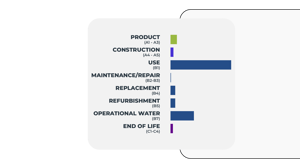
WHOLE LIFECYCLE CARBON ASSESSMENT
A Whole Lifecycle Carbon Assessment (WLCA) is conducted to determine the most sustainable products and systems for construction and renovation projects, as well as to estimate the whole life carbon emissions of a built environment over its entire lifespan.
DESIGN QUALITY ASSURANCE
We conduct first-rate Whole Lifecycle Carbon Assessments (WLCAs) in compliance with the guidelines set by RIBA and GLA. Our PhD-Level Scientists follow a thorough process to calculate whole life carbon emissions and gather all necessary information to ensure policy compliance. As per RIBA guidance, we recommend undertaking carbon assessments at key stages of a project, starting from the early design stages through to practical completion.
However, as a minimum requirement, a WLCA must be carried out before the technical design stage (RIBA Stage 4 or equivalent) of the project. Our team ensures that all the required data is collected and analysed to provide an accurate assessment of the carbon footprint of a building or infrastructure project. Trust us for comprehensive and reliable WLCA services.

MAKE INFORMED DECISIONS FOR A SUSTAINABLE FUTURE
Get in touch with our team of experts today to start your journey with Tunley Environmental

Case Study
PORR | TUNLEY ENVIRONMENTAL
PORR are developing materials, products and construction methodologies all the time that can reduce the impact on the environment. As part of the High Speed Two Project, they needed to achieve the PAS 2080 Accreditation; they also had to produce a carbon model for their product, identifying the carbon that was embedded in the product and seeking to reduce it by 50%.
177 tCO2e |
| Our Approach, experienced team, and proven track record in carbon reduction helped PORR reduce emissions by 177 tCO2e per linear kilometer of single track |
THE RIBA STAGES OF WORK
Whole Lifecycle Carbon Assessments are essential for the sustainability of construction and redevelopment projects within the built environment. We offer a carbon management plan that conducts life cycle assessments at every stage of a project whilst following the RIBA plan of work.
The RIBA Plan of Work organises the process of briefing, designing, constructing and operating building projects into eight stages. Within this, RIBA have provided standard guidelines on carbon reduction during the project, that is identical to the the Royal Institute of Chartered Surveyors' (RICS') WLCA for the Built Environment.

CARBON MANAGEMENT PLAN
Tunley Environmental will carry out a Carbon Management Plan, that conducts a WLCA at relevant project stages set by RIBA. Each WLCA report shall be conducted following calculations set out by internationally recognised standards BS EN 15978:2011 -Sustainability of Construction Works.
A Carbon Management Plan ensures the comprehensive management and implementation of greenhouse gas emissions throughout the total project lead time. This process assesses the sustainability impact of the design, capturing, quantifying, reporting, and improving upon whole life carbon emissions from concept design to ensure technical design aligns with sustainability goals.

Tunley are a great company to work with. With really helpful staff who make the whole assessment quick and painless.”
Andrew Dent
| BeeSwift
Tunley Environmental has been great support through our carbon assessments. Tunley completed an embodied carbon report on one of our products, we used the embodied carbon report and submitted to MAKE UK sustainability regional awards and won for our region. Great to be working with Tunley and the team and look forward to reaching our goal of net zero which I know we can with the support and expertise of the team.”
Scott Commons
HSQE Manager | PB Design
Stacey and Gareth were excellent in explaining the onboarding process and info gathering, taking much of the worry away from us and produced a really professional report and recommendations for achieving net zero. I would not hesitate to recommend Tunley Environmental to anyone considering starting on their carbon reduction journey.”
Andrew Swindley
Managing Director | Spear UK
From start to finish the whole team have excelled in communication and support. They made the entire process seemless, and nothing was too much for them. This is my first full experience completing a carbon assessment, and I couldn't have asked for a better company to complete this with.”
Rebecca Druce
SQE Manager | Spacecare
We found all of the Tunley Environmental representatives to be extremely friendly, helpful and knowledgeable. They provided a high standard of service with plenty of advice and support, including regular meetings to update on progress and present findings. We look forward to working with Tunley Environmental again on future projects.”
Mary Bellamy
Lead Research Nurse | University Hospitals Birmingham NHS Foundation Trust





MAKE INFORMED DECISIONS FOR A SUSTAINABLE FUTURE
Get in touch with our team of experts today to start your journey with Tunley Environmental
FREQUENTLY ASKED QUESTIONS
A Whole Lifecycle Carbon Assessment is the calculation of emissions produced by both the construction and the use of a building throughout its entire life, including its demolition and disposal. The assessment captures a building’s operational carbon emissions from energy use as well as its embodied carbon emissions (associated with raw materials extraction, manufacture, transportation, construction, maintenance, and demolition).
A Whole Lifecycle Carbon Assessment is a valuable tool for individuals, organisations, and industries looking to understand, assess, and reduce their impacts in the built environment. It provides data-driven insights that can inform decision-making, drive sustainability initiatives, enhance competitiveness, and meet the growing demand for environmentally responsible practices.
A Whole Lifecycle Carbon Assessment (WLCA) for construction projects offers numerous benefits, including the reduction of environmental impact, long-term life cycle thinking, and improved resource efficiency. It provides a comprehensive understanding of the supply chain, cost efficiency through reduced maintenance and operating costs, and a detailed assessment of operational and embodied carbon emissions.
In a Whole Lifecycle Carbon Assessment the operational and embodied carbon emissions will be calculated based upon data provided about the specifics of the construction project. This assessment can also include suggestions to reduce carbon emissions, including details of more sustainable material acquisition.



